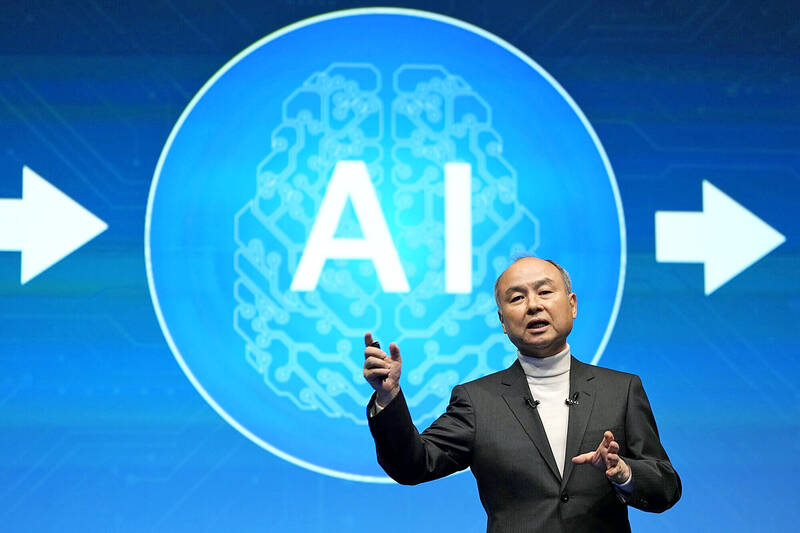Softbank Group Corp’s stock rose 1.5 percent to a new lifetime high yesterday, a vote of confidence in chairman and chief executive officer Masayoshi Son’s ambitions to ramp up investments in artificial intelligence (AI) and semiconductors.
The Japanese tech investor is gaining investor attention as its telecom arm moves aggressively to invest in generative AI, tying up with Microsoft Corp and start-up Perplexity AI Inc and building data centers stocked with Nvidia Corp accelerators.
Softbank’s chip unit Arm Holdings PLC is also trying to position its architecture as a means to conserve energy in devices running AI.

Photo: Toru Hanai, Bloomberg
The rally is a vindication for Softbank founder Son, whose reputation has been tarnished by big start-up bets that cost the company billions of dollars in recent years. The company’s close ties with Nvidia and OpenAI have strengthened its position amid a global race to build AI-related infrastructure.
Shares of Softbank got a lift in part because the benchmark Nikkei 225’s recovery is expected to help the investment firm’s earnings, according to Tomoaki Kawasaki, a senior analyst at Iwaicosmo Securities Co. “It’s getting another boost as more investors see it as a semiconductor-related stock,” he said.
A darling of retail investors, Softbank shares remain volatile. During the dot-com boom and bust, the company lost 99 percent of its market capitalization, erasing US$70 billion of Son’s wealth.
The company regained ground through two decades of effort rolling out broadband networks in Japan, selling the country’s first Apple Inc iPhones and investments in some of the world’s biggest start-ups.
But its shares plunged again in 2021 in the wake of Beijing’s crackdown on tech firms and a flurry of missteps including investments in start-ups such as WeWork, Katerra Inc, OneWeb Ltd and Zume Pizza Inc.
The share rise has also lifted Son’s rhetoric, with the billionaire making more grandiose pronouncements about the future of AI. Recently, he told shareholders he was preparing to swing for the fences, in a move that will make his previous bets seem like “warmups.”

SEEKING CLARITY: Washington should not adopt measures that create uncertainties for ‘existing semiconductor investments,’ TSMC said referring to its US$165 billion in the US Taiwan Semiconductor Manufacturing Co (TSMC, 台積電) told the US that any future tariffs on Taiwanese semiconductors could reduce demand for chips and derail its pledge to increase its investment in Arizona. “New import restrictions could jeopardize current US leadership in the competitive technology industry and create uncertainties for many committed semiconductor capital projects in the US, including TSMC Arizona’s significant investment plan in Phoenix,” the chipmaker wrote in a letter to the US Department of Commerce. TSMC issued the warning in response to a solicitation for comments by the department on a possible tariff on semiconductor imports by US President Donald Trump’s

‘FAILED EXPORT CONTROLS’: Jensen Huang said that Washington should maximize the speed of AI diffusion, because not doing so would give competitors an advantage Nvidia Corp cofounder and chief executive officer Jensen Huang (黃仁勳) yesterday criticized the US government’s restrictions on exports of artificial intelligence (AI) chips to China, saying that the policy was a failure and would only spur China to accelerate AI development. The export controls gave China the spirit, motivation and government support to accelerate AI development, Huang told reporters at the Computex trade show in Taipei. The competition in China is already intense, given its strong software capabilities, extensive technology ecosystems and work efficiency, he said. “All in all, the export controls were a failure. The facts would suggest it,” he said. “The US

The government has launched a three-pronged strategy to attract local and international talent, aiming to position Taiwan as a new global hub following Nvidia Corp’s announcement that it has chosen Taipei as the site of its Taiwan headquarters. Nvidia cofounder and CEO Jensen Huang (黃仁勳) on Monday last week announced during his keynote speech at the Computex trade show in Taipei that the Nvidia Constellation, the company’s planned Taiwan headquarters, would be located in the Beitou-Shilin Technology Park (北投士林科技園區) in Taipei. Huang’s decision to establish a base in Taiwan is “primarily due to Taiwan’s talent pool and its strength in the semiconductor

French President Emmanuel Macron has expressed gratitude to Hon Hai Precision Industry Co (鴻海精密) for its plan to invest approximately 250 million euros (US$278 million) in a joint venture in France focused on the semiconductor and space industries. On his official X account on Tuesday, Macron thanked Hon Hai, also known globally as Foxconn Technology Group (富士康科技集團), for its investment projects announced at Choose France, a flagship economic summit held on Monday to attract foreign investment. In the post, Macron included a GIF displaying the national flag of the Republic of China (Taiwan), as he did for other foreign investors, including China-based